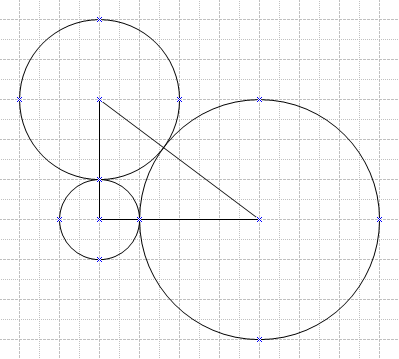Difference between revisions of "2006 AMC 12A Problems/Problem 13"
(→See also) |
(→Solution) |
||
| Line 7: | Line 7: | ||
<math> \mathrm{(A) \ } 12\pi\qquad \mathrm{(B) \ } \frac{25\pi}{2}\qquad \mathrm{(C) \ } 13\pi\qquad \mathrm{(D) \ } \frac{27\pi}{2}\qquad\mathrm{(E) \ } 14\pi</math> | <math> \mathrm{(A) \ } 12\pi\qquad \mathrm{(B) \ } \frac{25\pi}{2}\qquad \mathrm{(C) \ } 13\pi\qquad \mathrm{(D) \ } \frac{27\pi}{2}\qquad\mathrm{(E) \ } 14\pi</math> | ||
| − | == Solution == | + | ==Solution== |
| − | Let the radius of the smallest circle be <math> | + | Let the radius of the smallest circle be <math>r_A</math>, the radius of the second largest circle be <math>r_B</math>, and the radius of the largest circle be <math>r_C</math>. |
| + | <cmath>r_A + r_B = 3</cmath> | ||
| + | <cmath>r_A + r_C = 4</cmath> | ||
| + | <cmath>r_ B + r_C = 5</cmath> | ||
| + | |||
| + | Adding up all these equations and then dividing both sides by 2, we get, | ||
| + | |||
| + | <cmath>r_A + r_B + r_C = 6</cmath> | ||
| + | |||
| + | Then, we get <math>r_A = 1</math>, <math>r_B = 2</math>, and <math>r_C = 3</math> Then we get <math>1^2 \pi + 2^2 \pi + 3^2 \pi = 14 \pi \iff\mathrm{(E)}</math> | ||
== See also == | == See also == | ||
Revision as of 19:14, 19 June 2017
Problem
The vertices of a ![]() right triangle are the centers of three mutually externally tangent circles, as shown. What is the sum of the areas of the three circles?
right triangle are the centers of three mutually externally tangent circles, as shown. What is the sum of the areas of the three circles?
![]()
Solution
Let the radius of the smallest circle be ![]() , the radius of the second largest circle be
, the radius of the second largest circle be ![]() , and the radius of the largest circle be
, and the radius of the largest circle be ![]() .
.
![]()
![]()
![]()
Adding up all these equations and then dividing both sides by 2, we get,
![]()
Then, we get ![]() ,
, ![]() , and
, and ![]() Then we get
Then we get ![]()
See also
| 2006 AMC 12A (Problems • Answer Key • Resources) | |
| Preceded by Problem 12 |
Followed by Problem 14 |
| 1 • 2 • 3 • 4 • 5 • 6 • 7 • 8 • 9 • 10 • 11 • 12 • 13 • 14 • 15 • 16 • 17 • 18 • 19 • 20 • 21 • 22 • 23 • 24 • 25 | |
| All AMC 12 Problems and Solutions | |
The problems on this page are copyrighted by the Mathematical Association of America's American Mathematics Competitions. 










